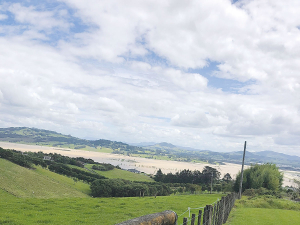Upper North Island Storms: Limited impact on dairy farms
For the most part, dairy farmers in the Waikato, Bay of Plenty, Tairawhiti and the Manawatu appear to have not been too badly affected by recent storms across the upper North Island.
 Many dairy farmers in Northland have copped a tough year and those near the Hikurangi swamp in particular have been severely affected.
Many dairy farmers in Northland have copped a tough year and those near the Hikurangi swamp in particular have been severely affected.
Be realistic about what you can in the short term - the recovery is a marathon not a sprint. That's the sage advice from one of the country's leading dairy consultants, James Allen, AgFirst.
He says those dairy farmers severely impacted by the cyclones should focus on the basics, such as making sure their fences are secure and that their stock have water.
Allen says he's aware that some farmers have had to send their stock to other properties because their water supply systems have been so badly damaged.
"They also need to start taking account of their feed supply in the immediate future and also what it might be like six or eight months out," he says.
James Allen says there is a lot of good advice available on how to deal with drying off and feed management. He says industry bodies such as DairyNZ are doing a good job getting this information out to farmers. He says farmers who have had to dry off early and who will have lost income need to communicate early with their financial advisors and banks.
"There is a lot of support out there for farmers and they shouldn't be afraid about asking for help. They need to talk to others because a problem shared is a problem halved," he says.
Allen says many dairy farmers in Northland have copped a tough year and those near the Hikurangi swamp in particular have been severely affected. Maize yields are down, summer crops have been damaged and there are instances of lameness and mastitis within herds. Farmers in east coast regions have also been badly knocked around and "my heart goes out to them", he says.
"But there are some regions which have enjoyed good rainfall and the growth conditions aren't too bad. There are parts of the Waikato, for example, which are going to see a strong end to the season with soil moisture levels good, making the grass grow well," he says.
Allen says he's just completed a feed update for the country which shows that, aside from the areas badly impacted by the cyclones, overall covers are feed reserves good. The exception he says is Southland and nearby regions that are dry.
"So we have this complete dichotomy where some areas are massively affected by storms and floods and others that are doing fine," he says.
Voting has started for the renewal of DairyNZ's milksolids levy.
The most successful catchment groups in NZ are those that have 'a source to sea' approach.
Associate Agriculture Minister and Manawatu dairy farmer Andrew Hoggard says the free trade agreement (FTA) negotiated with India is not a bad deal and his party, Act, will support it when it goes before Parliament.
Newly released data from Environment Canterbury (ECan) Farm Environment Plan (FEP) audits are showing a dramatic lift in environmental performance across the region.
A solid recovery of global dairy prices this year makes a $9.50/kgMS milk price almost a shoo-in for this season.
As New Zealand marks the United Nations’ International Year of the Woman Farmer 2026 (IYWF 2026), industry leaders are challenging the misconception that women only support farming.